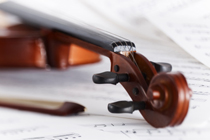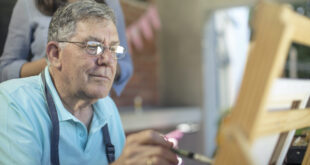Ok, so ageing does have its drawbacks. Our fingers may not be so nimble and possibly the mind to fingers transfer connection needs a little limbering, but often the biggest hurdle to learning a new instrument is not physical. It's the self-imposed mental grille that quickly descends when we even contemplate the idea. It's the monkey that sits on our shoulders telling us that we can't do something new, that we're too old to even try and to stop making an idiot of ourselves by thinking about it.
Someone erase that saying 'an old dog can't learn new tricks' from the record books. There are too many people around the globe that have, that can and that are with links to show you how good they became on the net.
 Take time to learn
Take time to learn
Kids, in learning something new, are a lot more kind to themselves. They're more patient. They will repeat something new over and over again without telling themselves they are morons. Kids still truly believe they are Superstars no matter how bad that recorder sounds or how flat they sing.
So to take one giant leap forward after having the courage to pick up a new instrument to begin to learn to play, the biggest thing we can do to help ourselves, is simply to allow ourselves the time and space to try. This means investing the time to take lessons and practise without putdowns, to allow ourselves time to progress, to recognise there will be many mistakes and that happens on the road to learning. It also means telling ourselves all the things we would tell a loved child or grandchild when they take up learning something new, but were so seldom told to us, especially by us.
The good news is ageing does have its upsides as well in that our minds are fully developed and familiar with complex constructs and so are more often able to grasp music theory. So now you've wrapped your head around learning what instrument do you want to play? Singers tend to go for learning the guitar or the piano, both versatile enough to accompany you on your journey to just about any genre, mood or style, but there are literally hundreds of others.
In selecting your instrument of choice, the next big bit of advice given by the new intermediate level players is kind of surprising. It is to not compromise on your choice of instrument, to recognise that learning a new instrument is going to take time, money and will power so you need to love it right from the outset, to love how it sounds and long to travel down the kind of musical roads it is going to lead you. Learning the bagpipes, for instance, is only going to lead in a certain musical direction, the bodhran as well. Some instruments are meant to be played with others, others revel in solo performances so after you've chosen the instrument you want to play, where and how do you envisage playing it?
Get started
Once that's sorted, there are practical realities to consider like actually buying or hiring the instrument you want to learn and having somewhere to practise that's not going to result in you becoming Public Enemy number one in the neighbourhood.
Going back to the guitar for example, take your time in choosing one to buy. Research it and talk to people who play it in the way you aspire to play it. Get their advice on the best place to buy one, preferable brands, how much money to spend and where to find the best teachers near you. In choosing a teacher, select one whose virtuoso performance inspires you. Book yourself in, find a place to practice, schedule time to do it and watch a whole new world open up.








Join the Discussion
Type out your comment here:
You must be logged in to post a comment.